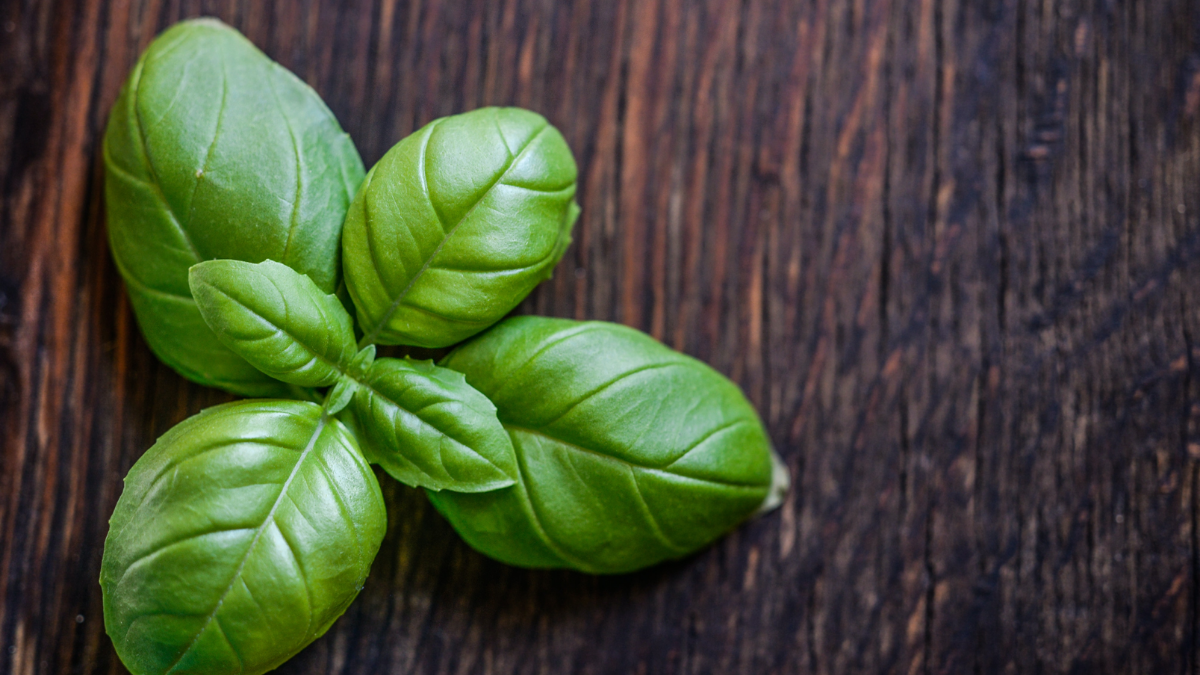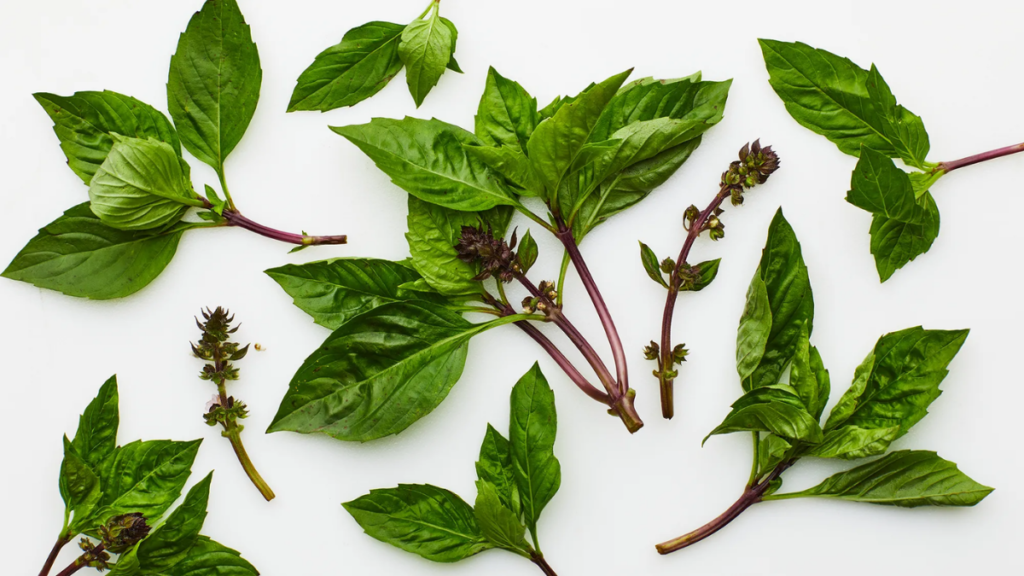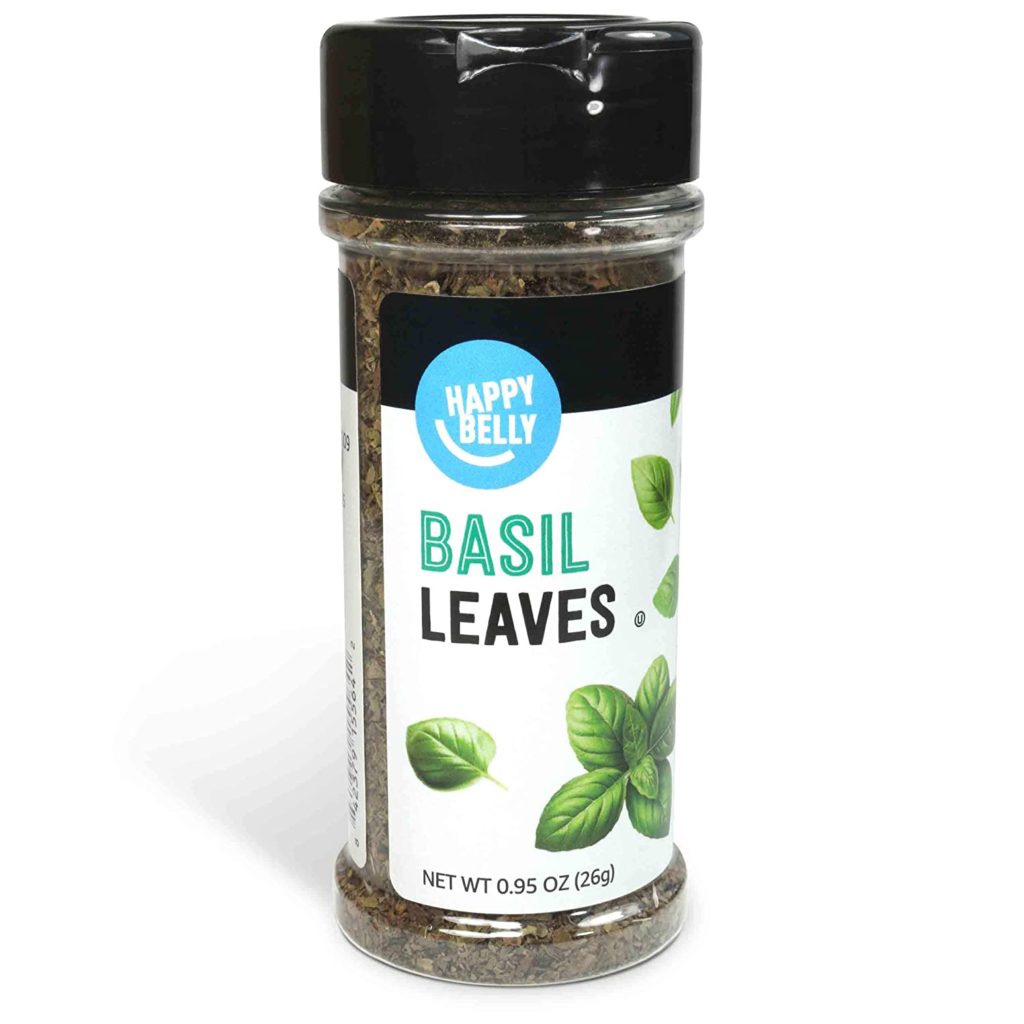Many vitamins and minerals, and antioxidants like lutein, zeaxanthin, beta-carotene, and beta-cryptoxanthin are found in basil. These antioxidants and essential oils are responsible for many of basil’s health advantages. Because these compounds are usually lost during the drying process, it’s best to use fresh basil. Antioxidants abound in basil. The chemical eugenol is found in sweet basil, while limonene is found in lime and lemon basil. These antioxidants, along with others like anthocyanins and beta-carotene, aid in the fight against free radicals in the body, which can cause cell damage and increase the risk of diseases like cancer, heart disease, arthritis, and diabetes.
Basil Nutrition Facts
Basil’s Health Benefits
Basil’s eugenol can help decrease blood pressure by blocking calcium channels. The herb’s essential oils can aid in lowering cholesterol and triglycerides. Basil also includes magnesium, allowing muscles and blood arteries to relax, improving blood flow.
Aids Digestion
The digestive system accounts for roughly 60% of all the resources produced by the body. Our immune system reacts to the emergence of gastrointestinal diseases such as celiac disease and lactose intolerance. Digestive inflammation causes the gut wall to expand, allowing toxins to pass past permeable barriers and into the circulation, where systemic inflammatory symptoms appear. Refined carbs, such as sugar and white wheat products, are not suitable for your intestines and should be avoided.
The digestive tract appears to benefit from holy basil’s anti-inflammatory properties. After or before a meal, chew on holy basil leaves. This method permits the leaf polyphenols to enter your digestive system, where they work to alleviate gastrointestinal inflammation symptoms. Chewing basil leaves also helps maintain an alkaline balance in the stomach, which benefits digestive health.
Reduces Stress and Anxiety
Multiple studies have indicated that the basil plant can act as an adaptogen. An adaptogen is a naturally occurring substance that can aid in stress adaptation and mental balance. Tulsi has been shown to assist the body manage with numerous types of stress, including chemical, physical, emotional, and infectious stress. According to an Ayurvedic study, Tulsi leaves contain antidepressant and antianxiety qualities comparable to diazepam and antidepressant drugs.
The best method to incorporate Tulsi into your diet is to add it to your herbal tea. Drinking it every day is safe and even suggested because it is caffeine-free. Boil a cup of water and add a spoonful of tulsi leaves to it. Cover for about 20 minutes, then drain and consume the concoction.
For Fever
For Fever, Basil leaves are used to treat fevers, particularly malaria and other contagious, eruptive fevers that are widespread in tropical locations. Lower the temperature by boiling leaves with cardamom in about two-quarters of a water cup, then add sugar and milk. A basil leaf extract in freshwater should be given every 2 to 3 hours; cold water sips can be given in dosages. This method is particularly effective in lowering newborn fevers.
Diabetes Management
Basil consumption may cause a slower release of sugar into the bloodstream, which is beneficial to people with diabetes. The glycemic index of the plant is relatively low, and the essential oil in basil also helps lower triglyceride and cholesterol levels, which are chronic risk factors for diabetics. Also, read Diabetics’ Complete Food and Beverage Guide.
Enhances Cognitive Function
Basil is high in magnesium and flavonoids, beneficial to the brain. Magnesium boosts memory and learning abilities, whereas flavonoids are linked to more extraordinary performance on cognitive exams. Basil herb aids in the reduction of stress hormones, particularly corticosterone. Lower corticosterone levels are linked to increased memory and mental clarity and a reduced risk of age-related mental illnesses.
Fights Cancer
Basil contains phytochemicals that have been found to help prevent cancer naturally, including chemically generated skin, liver, oral, and lung cancers. Basil can boost antioxidant activity, improve gene expression, induce cancer cell apoptosis (death of dangerous cells), and slow the spread of cancerous tumors. In animal studies, basil extract has been demonstrated to protect against cancer and death while also insulating normal tissue and cells from the adverse effects of cancer therapies such as radiation and chemotherapy.
Anti-Inflammatory Effects
Basil’s volatile oils have been demonstrated in research to have anti-inflammatory properties by inhibiting the activity of a cyclooxygenase enzyme in the body (COX). Others are over-the-counter pain relievers that function in the same manner as COX. Basil is an essential food for people who suffer from inflammatory diseases like rheumatoid arthritis or inflammatory bowel disease. Essential oils, including eugenol, citronellol, and linalool, are found in basil. They’re enzyme-inhibiting oils that can help reduce inflammation, which is the basis of many ailments like heart disease, rheumatoid arthritis, and inflammatory bowel disease.
Contains Antibacterial Properties
Basil essential oils have the virtue of preventing bacteria from growing and causing harm. Basil extract has also been demonstrated in trials to help suppress germs resistant to antibiotic treatments. The antibacterial efficacy of basil oil against E strains was investigated. Basil was beneficial in combating bacterial strains and inhibiting their growth using E. coli and other powerful germs gathered from afflicted people. As a result, researchers continue to investigate how basil and other antibacterial oils can aid in the fight against antibiotic-resistant diseases and infections.
Chronic Disease Prevention
Basil has been demonstrated to aid in preventing diabetes and cardiovascular disease. Basil has been demonstrated to lower triglyceride and cholesterol levels in the blood, linked to heart disease. Sweet basil has also been discovered to help reduce heart attacks and strokes by inhibiting blood clot formation. Beta-carotene is also abundant in basil.
This powerful antioxidant is converted to vitamin A in the body and is thought to protect arteries against cholesterol build-up. Basil extracts, particularly those present in holy basil, have been demonstrated to lower blood glucose levels in experimental animals and diabetics to prevent diabetes.
Treats cold
Due to its high antibacterial characteristics, a diet rich in basil improves the immune system, which is especially important as the weather begins to change and thus increases the body’s defenses against various diseases, including colds and flu. When you cough, chew basil leaves to benefit from the herb’s benefits.
Is Basil Good for Lowering Blood Sugar?
Including basil in your diet can help lower blood sugar levels. Basil extract was found to aid in treating diabetes in rats in a study. Basil may also aid in treating high blood sugar’s long-term effects. All parts of the holy basil plant can help you lower your blood sugar if you have prediabetes or type 2 diabetes.
Holy basil has been demonstrated in animal and human tests to help avoid diabetic symptoms such as weight gain. Excess insulin in the blood is known as hyperinsulinemia. You can chew some tulsi leaves every day to absorb all of their benefits. Tulsi tea can also be made by steeping a few leaves in hot water. Strain the water after two to three minutes and drink a cup of it every day.
Is Basil Beneficial to the Liver?
Basil may help maintain your liver healthy by preventing fat build-up. Basil may assist in maintaining your liver healthy by preventing fat build-up. Basil also aids in the restoration of the body’s normal pH levels and nourishes the gut microbiome with beneficial bacteria. Basil essential oils, such as eugenol, linalool, and citronellol, can aid the body combat inflammation. These anti-inflammatory characteristics may aid in the prevention of inflammatory diseases like arthritis.
Heart disease and gastrointestinal problems are two of the most common ailments. Antibacterial properties are found in basil. Basil is a good source of calcium, iron, folate, magnesium, and omega-3 fatty acids and an excellent vitamin K and manganese source. It is also a good source of copper, vitamin A (in the form of carotenoids such as beta-carotene), and vitamin C (in the form of carotenoids such as beta-carotene).
Is it Okay if I Eat Basil Every Day?
One can notice a rise in antioxidant activity and a decrease in blood sugar levels after taking Basil leaves daily. Basil leaves can also aid persons with mental health issues such as anxiety and sadness. When ingested in minor amounts, basil is generally harmless, but a few precautions to take. Basil leaves contain a lot of vitamin K, which aids with blood clotting.
High intakes may interact with blood-thinning medications like warfarin. Sweet basil is to go if a recipe asks for “basil.” Other types may have more robust flavors, which can cause unforeseen consequences in your recipes. The flavor of holy basil is best cooked (it can be bitter raw), but the color of purple basil is best left raw because it turns black when cooked.
Can you Use Basil for Tea?
While basil is primarily known for its use in Italian cooking, it also adds a unique flavor to the tea. This recipe differs from our other herbal tea recipes in that it uses a slightly different approach. Because basil’s flavor isn’t strong enough, mix it with black tea and lemon to make the ultimate drink! Bioactive chemicals found in holy basil, such as eugenol, camphene, cineole, and camphor, may aid in opening your airways and enhance breathing.
Antimicrobial and antiviral properties of these substances may help shorten the duration of common cold and flu symptoms. Holy basil is also known as Sacred Basil or Tulsi and is a sIted plant in Hinduism, and its le can be used to make immune system-boosting tea.
Conclusion
Basil cultivars have different volatile aromatic compounds, and hence different basils have different smells. The essential oil of European basil contains considerable amounts of linalool and methyl chavicol (estragole), with a 3:1 ratio. Other ingredients include 1,8-cineole, eugenol, and myrcene. The chemical eugenol gives sweet basil its clove scent, and basil has 1,8-cineole and methyl eugenol in its fragrance profile. In this species, eugenol is made from conifers acetate and NADPH. Some can be used as insect repellents; see the section below for further information.




